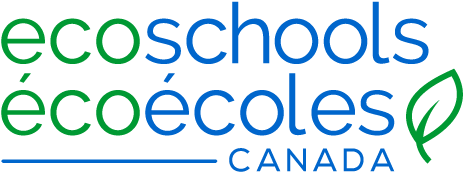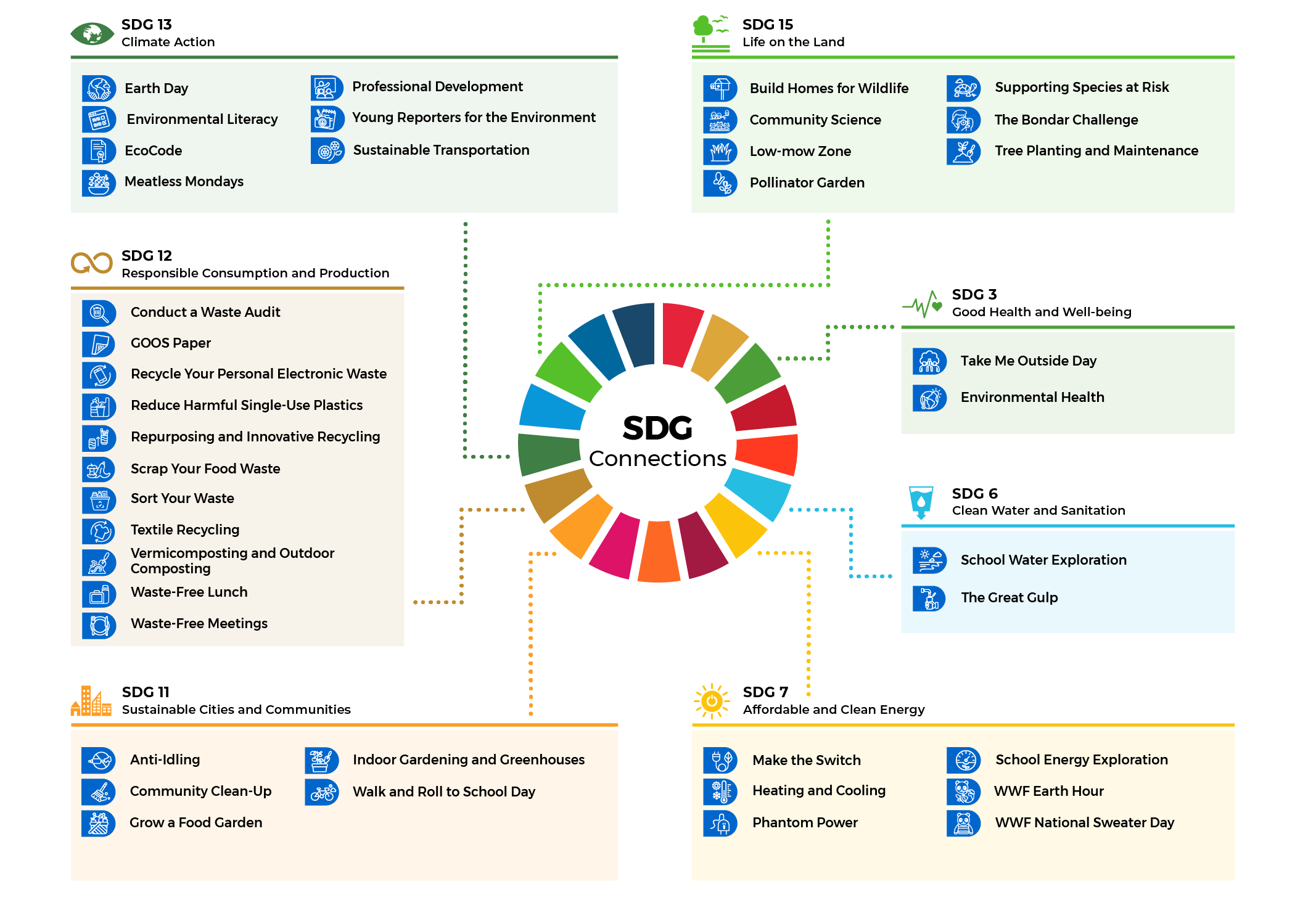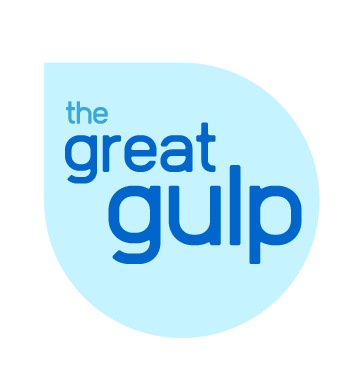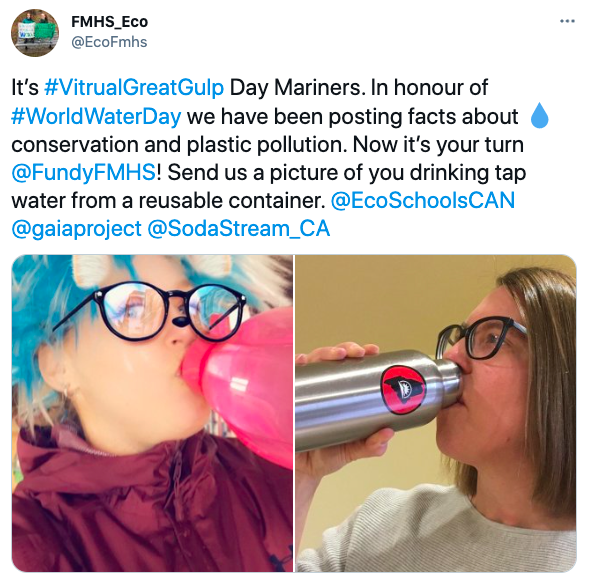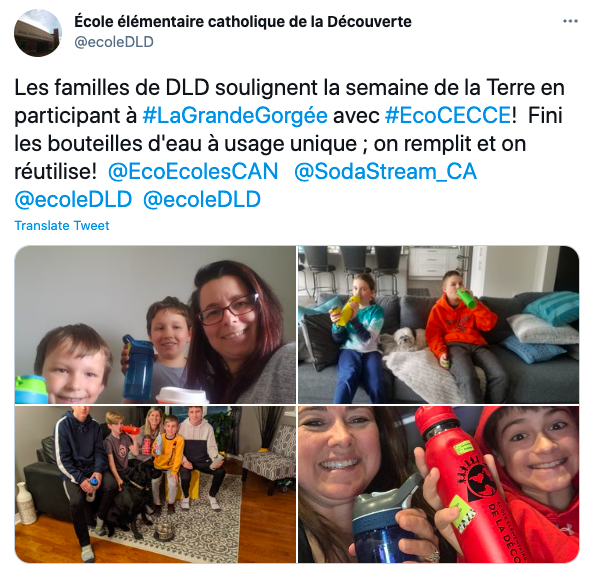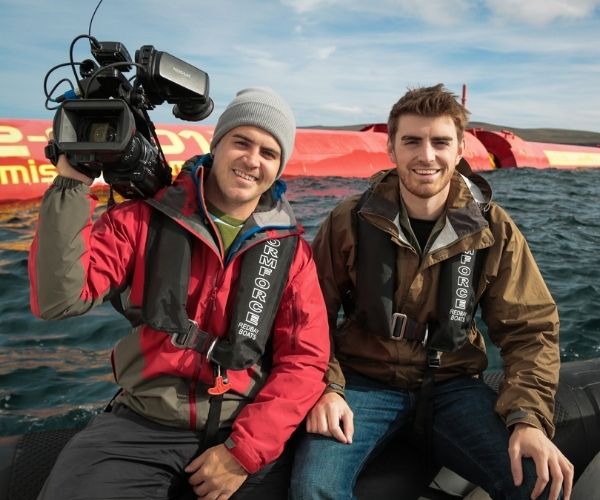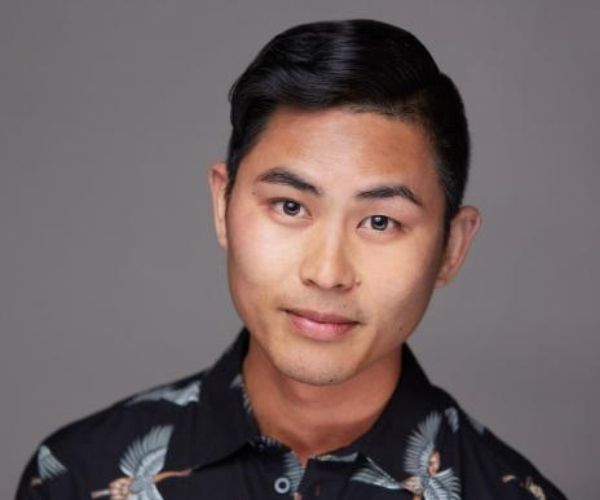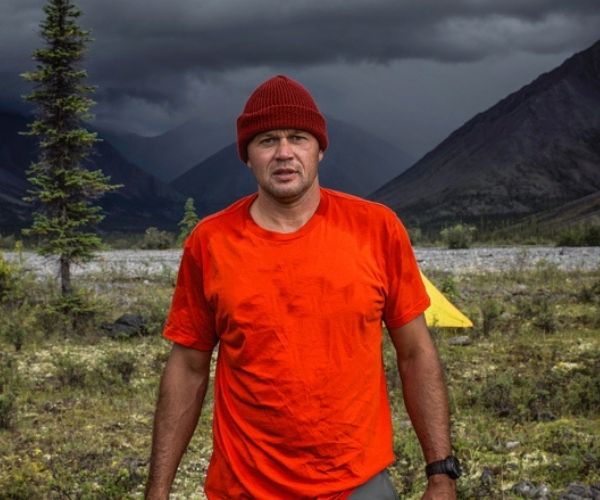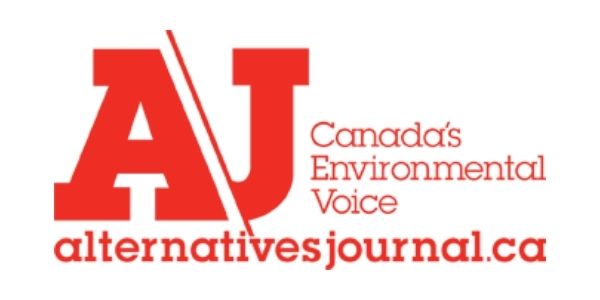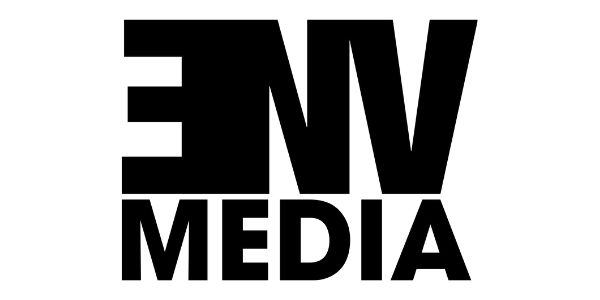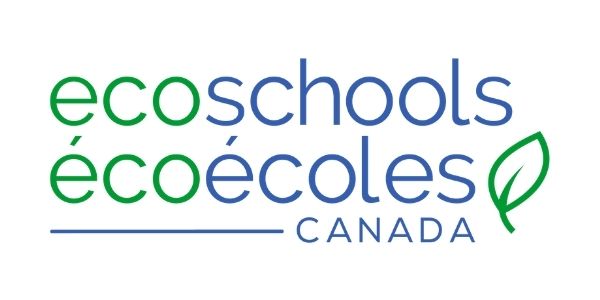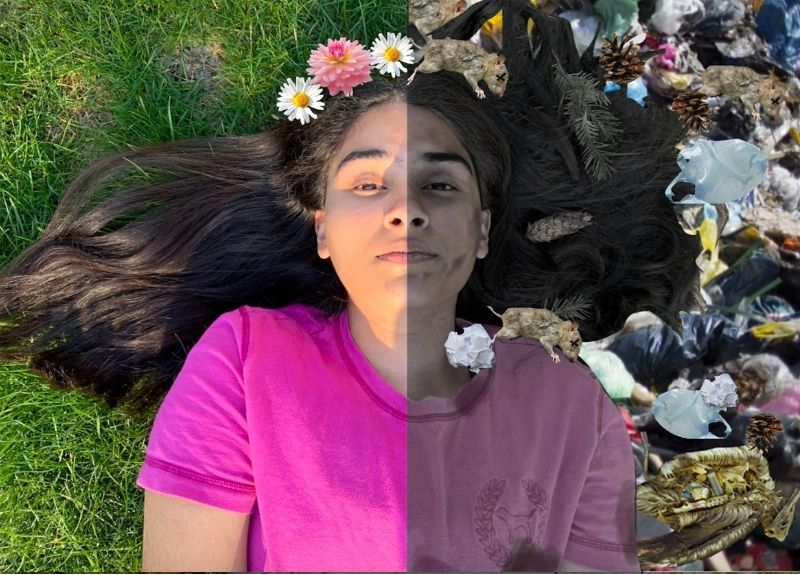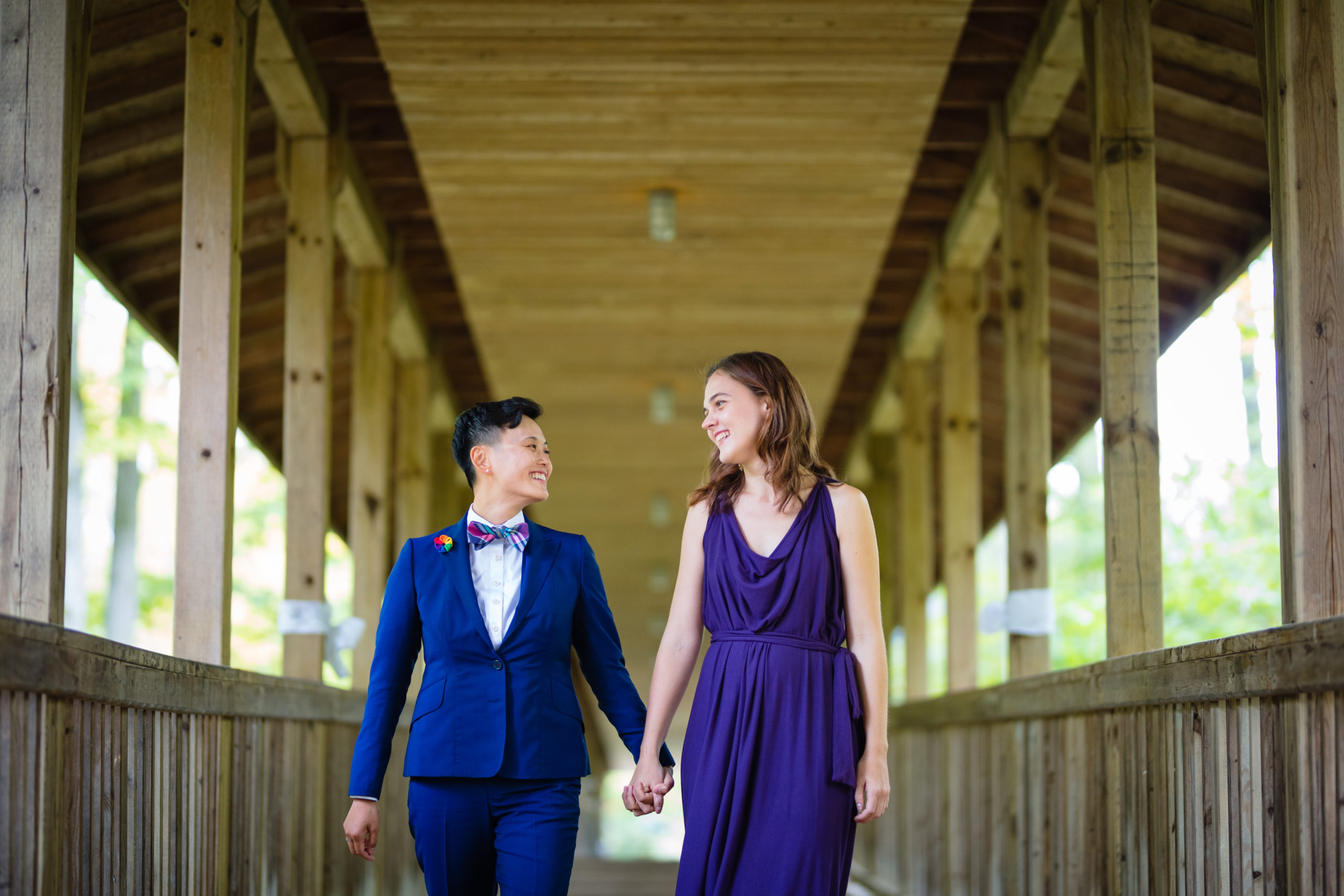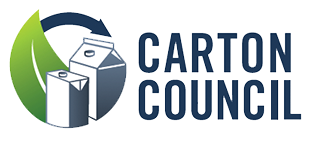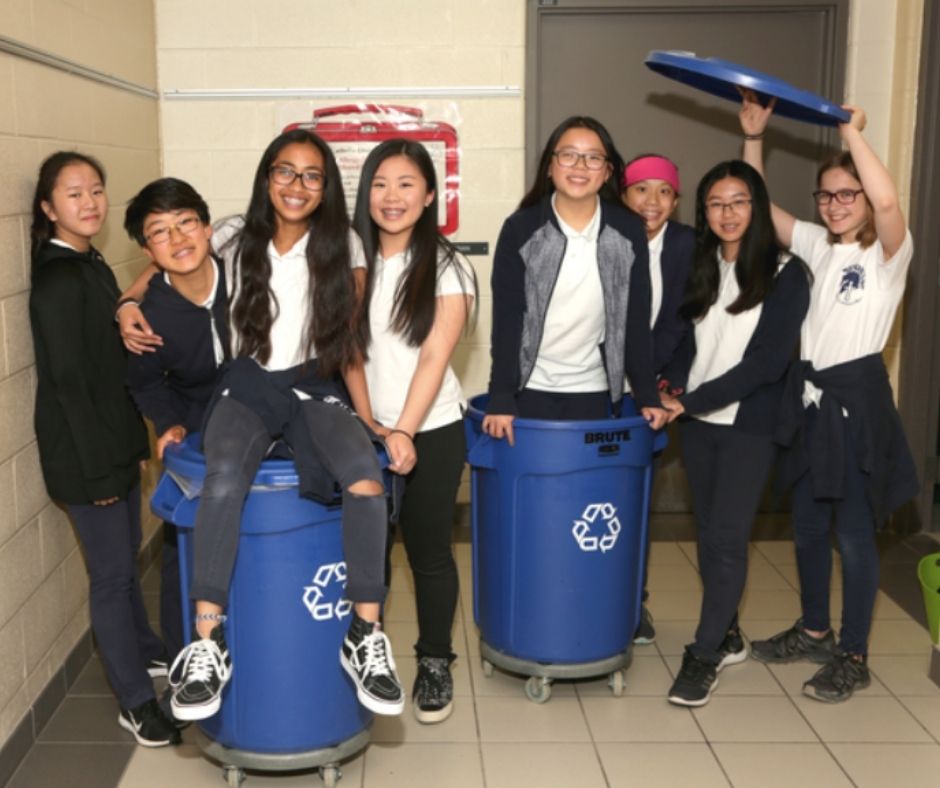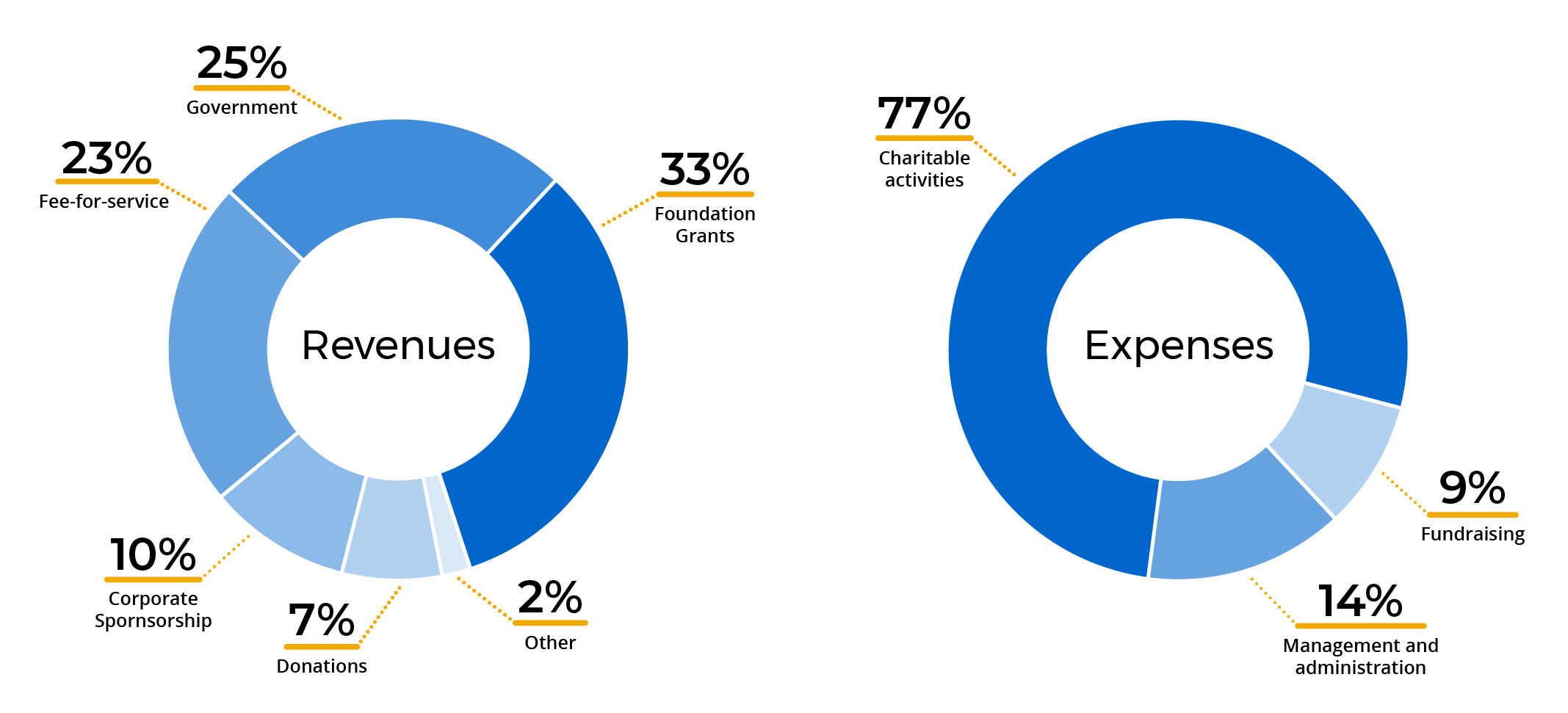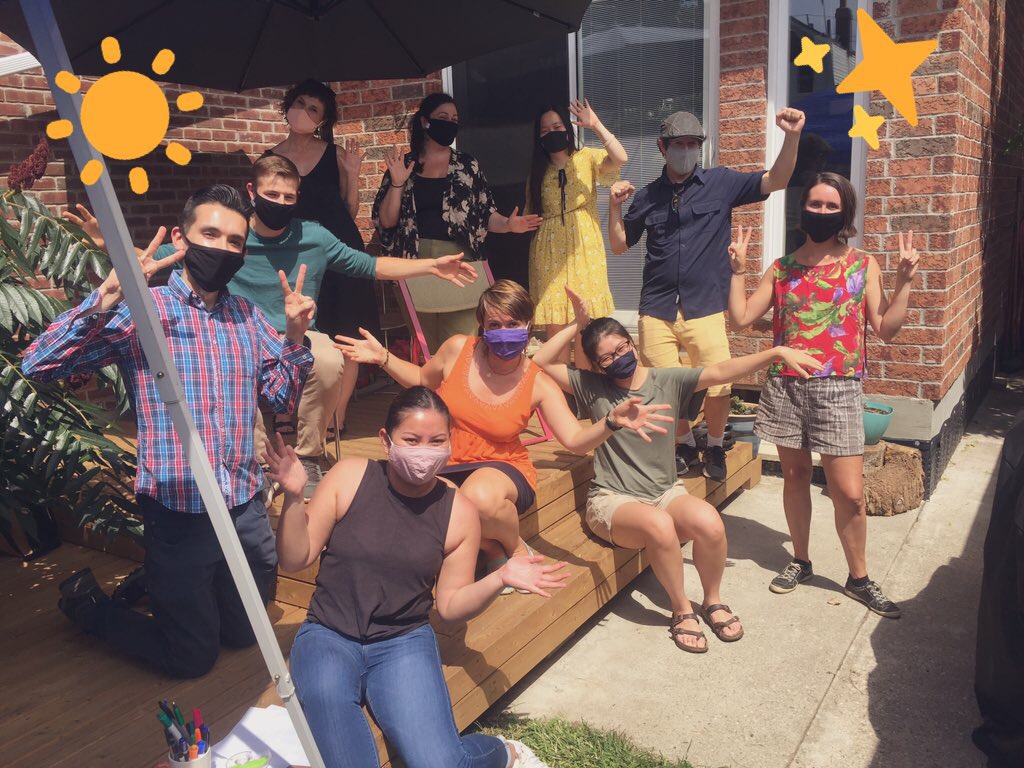ANNUAL REPORT 2019-2020
The power of partnerships
Lindsay Bunce | Executive Director
In a year of physical distancing and isolation, more than ever before, our team has been reflecting on the power of partnerships. In spite of the many challenges we faced this year, we saw students and educators across EcoSchools’ network come together in new and innovative ways to lift each other up, take action in their communities, and address the climate crisis.
This was a year of discovery and learning for our team, as we piloted national program delivery and introduced EcoSchools certification to new regions across Canada. As we redefined our work to more authentically support diverse communities from coast to coast to coast, the importance of recognizing the intersectional nature of racial justice, environment, and health and wellness became front and centre. As an organization, we continue to look both inward and outward to help ensure that our program and work spaces reflect these key priorities. As the EcoSchools organization grows, we are eager to carry these learnings forward by deepening our commitment to program development that is informed by and intrinsically tied to the needs of our community.

To everyone across the EcoSchools community, I want to say thank you; to our growing national network of community partners who are ensuring we are regionally relevant to school communities from coast to coast to coast; to school boards and districts who have shown their commitment to sustainability by weaving the EcoSchools program into their current and future plans; and to our student and youth partners, especially those that make up our first-ever Youth Advisory Committee (YAC), for helping us ensure youth voices are at the heart of what we do. Your contributions are invaluable and are shaping environmental learning and climate action in Canada. We are grateful to be working in partnership with you.
Whether you’ve been part of the EcoSchools mission for years, or are exploring it for the first time, there’s a place for you here. We are stronger than ever, because we are standing together.
EcoSchools have impact!
What we know
89% of our 2018-19 schools continued their participation into the 2019-20 school year.
Over 50% of participants from schools surveyed indicated that the student leadership opportunities available through our programs is a primary driver for participating in EcoSchools.
Over 1,700 schools received special recognition for participating in EcoSchools actions amidst a global pandemic.
What we learned
76% of schools surveyed said that they value being a part of the national and international EcoSchools network.
84% of teachers are likely to recommend the EcoSchools program to other teachers.
78% of teachers feel that EcoSchools has benefitted them personally and professionally.
89% of school boards said the EcoSchools framework helped shape their board policies. This is a key element of system-wide change in the education sector!
What we love
Over 30,000 Great Gulps were taken during the Great Gulp campaign, recognizing and celebrating World Water Day.
695 amazing artists submitted design concepts for the official EcoSchools t-shirt.
Over 1,000 schools have been pursuing certification for 7 years or more. That’s a huge commitment! Keep it up!
Connecting to the UN’s Sustainable Development Goals (SDGs)
The actions that schools take as part of the EcoSchools certification program directly contribute to our global effort to achieve the United Nations’ Sustainable Development Goals (SDGs).
A new program framework and online application
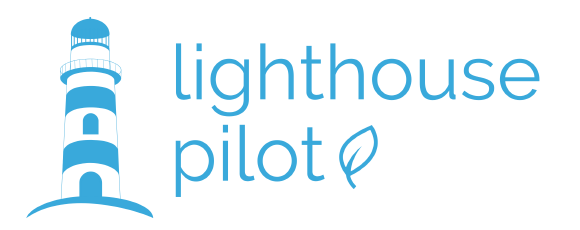
For the past three years, EcoSchools Canada has been working in consultation with knowledge experts across the environment and education sectors to reimagine and enhance our certification framework. The goals of this process were to make certification more accessible to participating schools from coast to coast to coast while providing an in-depth understanding of environmental learning and climate action.
In 2019-2020, we worked with a group of experienced EcoSchools in Ontario and a group outside of Ontario who were new to certification to participate in what we called the Lighthouse Pilot program. Throughout the year, these schools were instrumental in testing this new online framework to ensure that it was relevant, engaging, and easy to use.
To engage new schools for the pilot, we partnered with regional expert The Gaia Project in New Brunswick, a non-profit charitable organization focusing on climate and environmental education. Through this incredible partnership, the pilot program reached 27,487 students and logged 356 completed actions over the course of the year, a monumental achievement made possible through this collaboration.
The Lighthouse Pilot experience proved to be an essential part of the evolution of the EcoSchools Canada program, and the feedback, insight, and knowledge gained allowed the EcoSchools team to move forward into the 2020-2021 school year with an even-better program offering for all schools in Canada.
To learn more about the EcoSchools Certification Application (ECA) platform, please visit our Certification FAQ.
Taking ‘The Great Gulp’ home
In March of 2020, many schools across the country suspended in-person learning in an effort to keep staff and students safe.
To meet the changing needs of educators and students during this time, EcoSchools Canada surveyed school communities to better understand their needs and identify key ways we could provide additional support. The invaluable feedback received included a clear call for educational resources and campaigns suited for at-home and virtual learning environments.
Enter The Great Gulp, a perennially popular environmental campaign that aims to raise awareness about drinking water and reducing single-use plastic bottles. Through The Great Gulp, educators and students can learn about water as a vital resource and discuss equitable access to clean tap water, particularly for many Indigenous communities facing long term boil-water advisories. Schools then come together and hold a synchronized gulp of tap water from a glass, mug, or reusable bottle in regions where safe and healthy tap water is accessible.
Though The Great Gulp can take place any time of year, the campaign is often centred around World Water Day on March 22. Throughout the month of March, it’s common to see social media feeds lighting up with photos and videos of EcoTeams, classrooms, and entire schools gathering in hallways, cafeterias and gymnasiums to take part in The Great Gulp together. In March 2020, with schools closed and plans interrupted, many EcoTeams took advantage of a newly-updated Great Gulp campaign toolkit and strategies from EcoSchools Canada to pivot their in-school campaigns to virtual ones.
One such EcoTeam from Fundy Middle and High School in St. George, New Brunswick shares their experience participating in The Great Gulp for the first time last year.
“Our initial in-school plan involved putting up posters around the school and regular announcements that would be seen by the entire student body, and info for parents in our weekly Mariner Nation newsletter. Without those options available to us, we decided the best way to connect with as many students as possible was through our Eco_FMHS Instagram and Twitter accounts,” explains high school teacher Amy Cook.
Using their social media presence to increase awareness and generate excitement leading up to the event, students reframed their messaging and planning for in-school media to a virtual format.
“We wanted to use the days leading up to The Great Gulp to educate our school community about the importance of clean water, reducing water waste, and choosing tap-water over bottled water as a means of reducing plastic waste,” Amy recounts. “ From Monday to Thursday, we created infographics about water and posted them to our social media accounts in the hopes of raising awareness prior to the event itself. On the day of The Great Gulp, we encouraged all members of our school community to connect to our social media accounts by sharing pictures of them taking a drink of tap water from a reusable container.”
École élémentaire catholique de la Découverte also leveraged social media as a tool to encourage students and their families to participate in The Great Gulp from home. “By announcing the activity on our social media and in our weekly newsletter, families were able to easily participate in the home activity and send supporting photos to spread the word on our social media.”
When asked if they’d be holding a Great Gulp in 2021, both schools said they’re looking forward to it. “Our middle level students are learning in person everyday this school year, and our high school students are in person every other day. We see this as an opportunity to build on what we started last year. We plan to have an in-person event, as well as a virtual event for those learning from home on that day,” explains Amy Cook.
“We’re planning on holding another Great Gulp this year,” adds Isabelle Sauvé. “It’s an activity that builds awareness, doesn’t cost money or take a lot of time to organize, and can have a great impact on the environment.”
These can-do attitudes and continued commitment to environmental learning and climate action, even in the face of adversity, beautifully represent the program’s values shared by all EcoSchools across Canada.
Lights, camera, climate action!
Young Reporters for the Environment (YRE) is an international environmental journalism competition hosted by the Foundation for Environmental Education (FEE) in which students have the opportunity to develop skills in photography, videography, and storytelling.
In 2019-20, EcoSchools Canada embraced the opportunity to coordinate the national YRE Canada competition by adding it to the toolkit of actions available to schools. Submissions were judged by an expert panel of industry professionals: Alex and Tyler Mifflin, creators of the acclaimed documentary series, The Water Brothers; YRE Canada alum Vinh Le from interior design firm, Level Studio Inc.; filmmaker Alessandra Cannito of the Planet in Focus film festival; David McConnachie of Alternatives Journal; Theo Ossinga of ENV Media; director and photographer Jason van Bruggen; and EcoSchools Canada’s own Executive Director Lindsay Bunce. Winning submissions were published by Alternatives Journal and ENV Media and submitted to YRE’s international tier of competition.
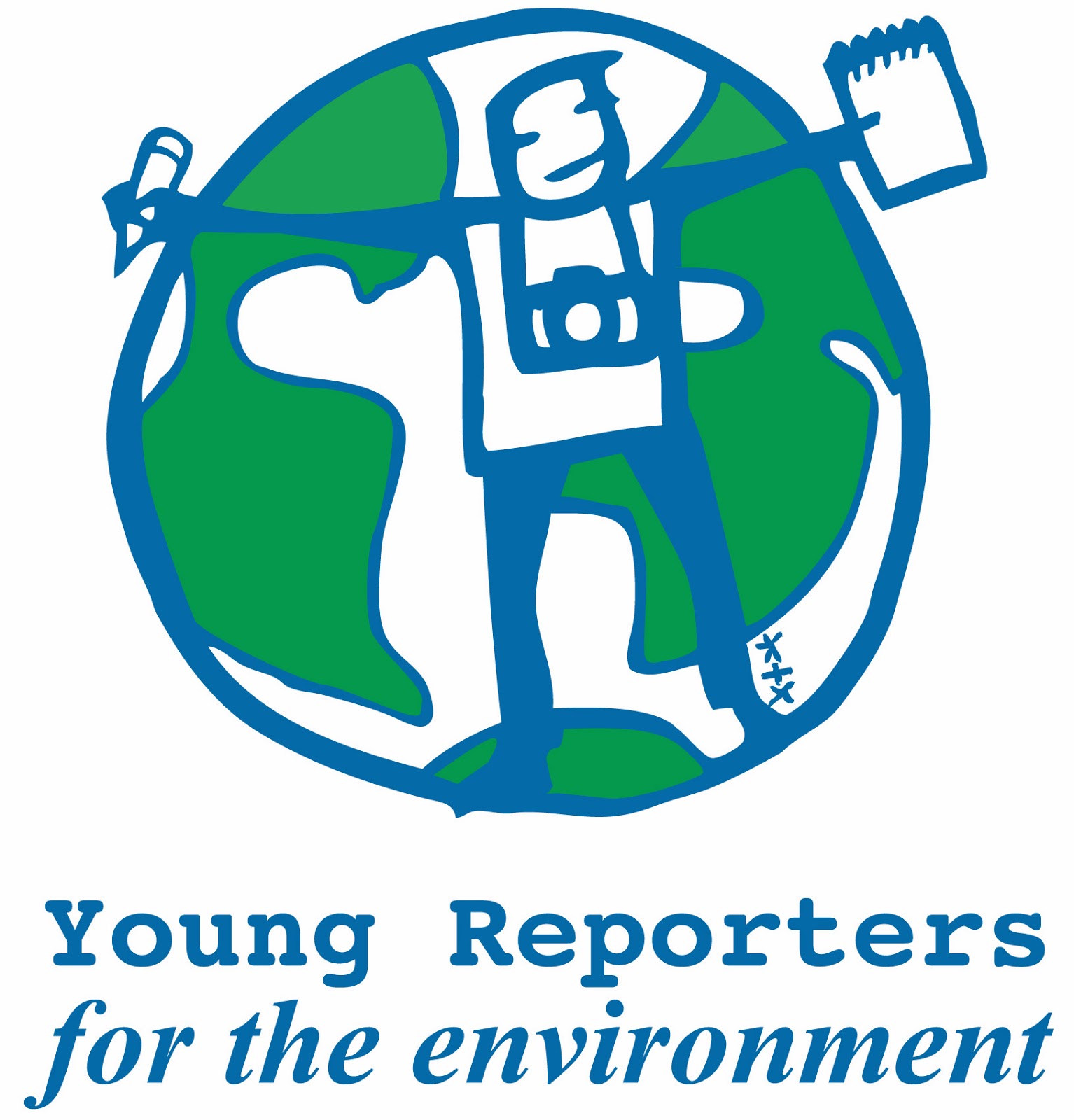
The first place photo in the Photography (Ages 15-18) category, “The Future of Our World,” was submitted by a group of students from Seaquam Secondary School in Delta, British Columbia. Creators Gurleen Bhandal, Navreen Sekhon, and Srishti Singh had a chance to speak with us about their motivations to compete. “I’ve always been interested in climate justice and have spent much of my time volunteering at my school’s environmental club,” says Navreen. “I was intrigued by the creative freedom students were given when it came to their submissions.”
Social Studies teacher and sponsor of the Seaquam Environment Club, Michael Iachetta, strongly believes in the importance of environmental education and incorporates YRE into his lessons. “The competition requires students to develop technological, communication, teamwork, organizational and reporting skills. . . I was thrilled to learn about a student-centered program that challenges and empowers students to become young change-makers who take action in their school communities.”
The students managed to snap their photo submission just before the COVID-19 pandemic forced restrictions on in-person gatherings. Despite the challenges of working in isolation, Michael notes his pride in seeing the students’ commitment to climate action: “I am very proud of [the 2019-20]’s winners who chose to pursue their passions for raising awareness and change . . . when most Canadians were finding ways to reduce their commitments. These young change-makers found ways to overcome adversity and used multi-media platforms . . . to communicate when creating group projects while working in isolation.”
The students very much agree that their efforts were worth it. “I believe YRE is important for young people to participate in as it teaches them not only new skills . . . but provides them with a platform from which they can create an impact and raise their voices for a change they support,” comments Srishti. “It is a perfect combination of learning and having fun.” “Taking part in environmental journalism also opens up many opportunities for young people in the future as well,” adds Gurleen. “We all need to step up and help our planet to ensure that the planet is not damaged anymore.”
Expanding on 2019-20’s success, YRE Canada is now a fully embedded environmental action in the new online EcoSchools Certification Application, creating the opportunity for students to connect to local curricula while fulfilling certification criteria. Navreen, Gurleen and Srishti are all looking forward to participating in the 2020-21 competition along with Mr. Iachetta, who is also working on making Seaquam Secondary’s school district one of the first in western Canada to earn EcoSchools certification. Good luck to all participants in 2020-21!
Please note that all Young Reporters for the Environment (YRE) competition documents are currently only available in English and submissions must also be in English.
We are exploring funding opportunities to make this program accessible to the Francophone community. Stay tuned!
Donor High-Five
EcoSchools Canada supports young leaders in addressing the impacts of climate change. Donors like Tania Cheng and Dana Decent understand the importance of individual giving and how it plays a key role in promoting environmental learning and action. Being true to their values, the couple decided to marry their celebration of love with their commitment to climate action. In lieu of wedding gifts in fall 2019, they asked their guests to donate to charities that were important to them, like EcoSchools Canada.
“With today’s environmental challenges, we need people who know they can make a positive difference in the world. The EcoSchools program provides opportunities for children and youth to discover and develop their own sense of agency and belief that they can make the world a better place.”
“We were privileged to be in a position where we could direct any gifts to a cause we cared about. It was also an opportunity to introduce our community to this cause and organization that mattered to us.”
When it comes to navigating charitable giving, Dana and Tania have some thoughts to share: “Start with mapping your values, what you care about, and your vision for a better world. Then, get to know and build authentic relationships with organizations that are working on the issues you are passionate about [and] donate dollars with no strings attached—this allows them to do the work they do best.”
As EcoSchools grows nationally and expands its programs to reach youth leaders from coast to coast to coast, it is even more meaningful for charitable supporters like Dana and Tania to give. “Environmental learning and climate action is deeply underfunded in Canada—it is not proportional to the impact and the urgency of the challenge before us. Thus it’s all the more important to support organizations like EcoSchools Canada.”
Thank you, Dana and Tania, for your generosity and unwavering commitment to environmental learning and climate action!
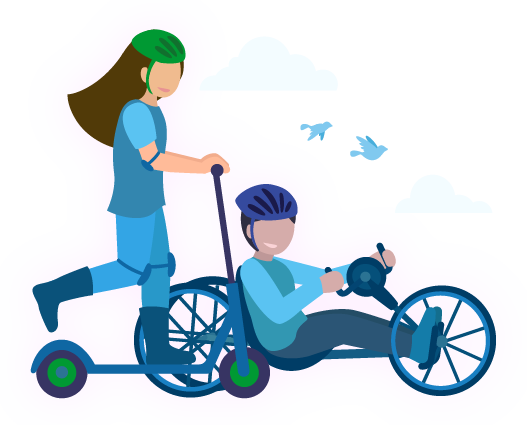
You can join Tania, Dana and many other incredible donors like them by helping us build environmental leadership in Canada.
EcoSchools and Carton Council of Canada
Teaming up to support better recycling in schools
A focus on waste minimization has been a core part of the EcoSchools certification program for over 15 years. When it comes to understanding waste habits, conducting a school waste audit is a key tool that gives students and their school communities a clear picture of the waste they create, and can provide essential information about improving their environmental behaviour. A waste audit also enables learning through data collection and analysis, and can identify gaps and opportunities in building the connection between responsible waste management and environmental action.
In the fall of 2019, EcoSchools Canada partnered with the Carton Council of Canada, a coalition of carton manufacturers working together to deliver long-term solutions to help increase carton recovery and recycling. With their support, we reimagined what our school waste audit process could look like and get a clear idea of how recycling is taking place in schools.
EcoSchools developed new waste audit materials that supported more detailed data collection, created outreach materials, and administered surveys for schools and school boards to better understand any barriers to recycling cartons. These resources are accessible through the online EcoSchools Certification Application and are available for registered schools who want a comprehensive look into their own recycling behaviours.
The surveys and 2019-20 waste audit data revealed an encouraging fact: the capture rate for cartons and drink boxes in participating schools is approximately 70%, indicating that schools are making a respectable effort at putting waste in the correct bins. The data provided through this partnership will enable both EcoSchools Canada and the Carton Council of Canada to further refine our messaging to address specific challenges and barriers identified by schools. It will also support schools in setting more impactful waste diversion targets in future years, allowing them to deepen their commitment to waste reduction and improve their overall sustainability.
With the support of our partners, EcoSchools Canada is able to provide students with resources they can use to lead environmental action in their communities. We’re looking forward to more future partnerships and continuing to create innovative solutions that will support youth environmental leadership.
Financial Summary
Thank You
A heart-felt thank you to the following amazing groups for their generous support of the EcoSchools program.
Supporters, Donors, and Friends
Alberta Council for Environmental Education
Alternatives Journal
Alternatives Media
Bag2School
Bridgeraise
Carton Council of Canada
Cascades Inc.
CS&P Architects
eCycle Solutions
EECOM
Enviro Edu-Action
Environmental Defence
etee
Evergreen
Finnovate
Foundation for Environmental Education
Gaspard Regalia Inc.
Government of Canada
GreenLearning
Green Communities Canada
Louis Courteau
Level Studio
Moccasin Identifier Project
Natural Curiosity
Nutritower
OISE (University of Toronto)
Ontario Trillium Foundation
Pollinator Partnership Canada
Project Neutral
RBC Foundation
SK Films
SodaStream
Take Me Outside
TD Friends of the Environment Foundation
Teachers Life Insurance
The Gaia Project
The Peter Gilgan Foundation
Toronto and Region Conservation Authority
Toronto District School Board
UnWrapIt
WWF Canada
Board of Directors
Ron Ballentine, Retired, Halton District School Board
Freda Bi, University of British Columbia
Michelle Boutin, Rogers Communications
Bala Gnanam, BOMA Toronto
Jeremy Lin, Osler, Hoskin & Harcourt LLP
Jacob O’Connor, CanadaHelps
Steven Pacifico, EPIC Investment Strategy
Stephanie Rodrigues, Ernst & Young
Martha Turner Osborne, Teachers Life Insurance
Finance Committee
Freda Bi, University of British Columbia
Priscilla Leung, KPMG
Belinda Mark, Adams & Miles LLP
Evnah Ramiah, Morneau Shepell
EcoSchools Program Advisory Commitee (EPAC)
Suzanne Burwell, Halton District School Board
Tanya Murray, York Region District School Board
Erin Mutch, Thames Valley District School Board
Lewis Molot, York University
Jenn Vetter, Toronto District School Board
Eleanor Dudar, Alumni, Ontario EcoSchools Steering Committee Member
Steve Allum, Halton Catholic District School Board
James Bond, Waterloo Region District School Board
Peggy Cheng, Toronto and Region Conservation Authority
Lauri Geuzebroek, Durham District School Board
Beatrice Groux, Conseil scolaire Viamonde
Ron Ballentine
EcoSchools National Advisory Commitee (ENAC)
Michèle Andrews, Canadian Accredited Independent Schools (CAIS)
Xavier Fazio, Brock University
Shannon Harding, Clean Foundation
Kate Henderson, Science World British Columbia
Geoff MacDonald, The Gaia Project
Nancy McGee, Toronto and Region Conservation Authority, Peel EcoSchools
Mary McGrath, GreenLearning
Kerrie Mortin, Wild Schools BC
Kathy Nguyen, WWF
Gareth Thomson, Alberta Council for Environmental Education (ACEE)
Marie Tremblay, Alberta Council for Environmental Education (ACEE)
Jenn Vetter, Toronto District School Board
Our Team
Full Time Staff
Lindsay Bunce
Ludiwine Clouzot
Galen Drinnan
Ryan Dyment
Sierra Frank
Clara Luke
Josh Padolsky
Edvirge Prédestin
Theresa Ramirez
Alex Rámos
Michelle Shahoud
Jenny Struyk
Part Time Staff
Natalia Bekirsky
Alysse Kennedy
Richard Prager
Maggie Chang
Katherine Chien
Meg Enciso
Derek Thiele
